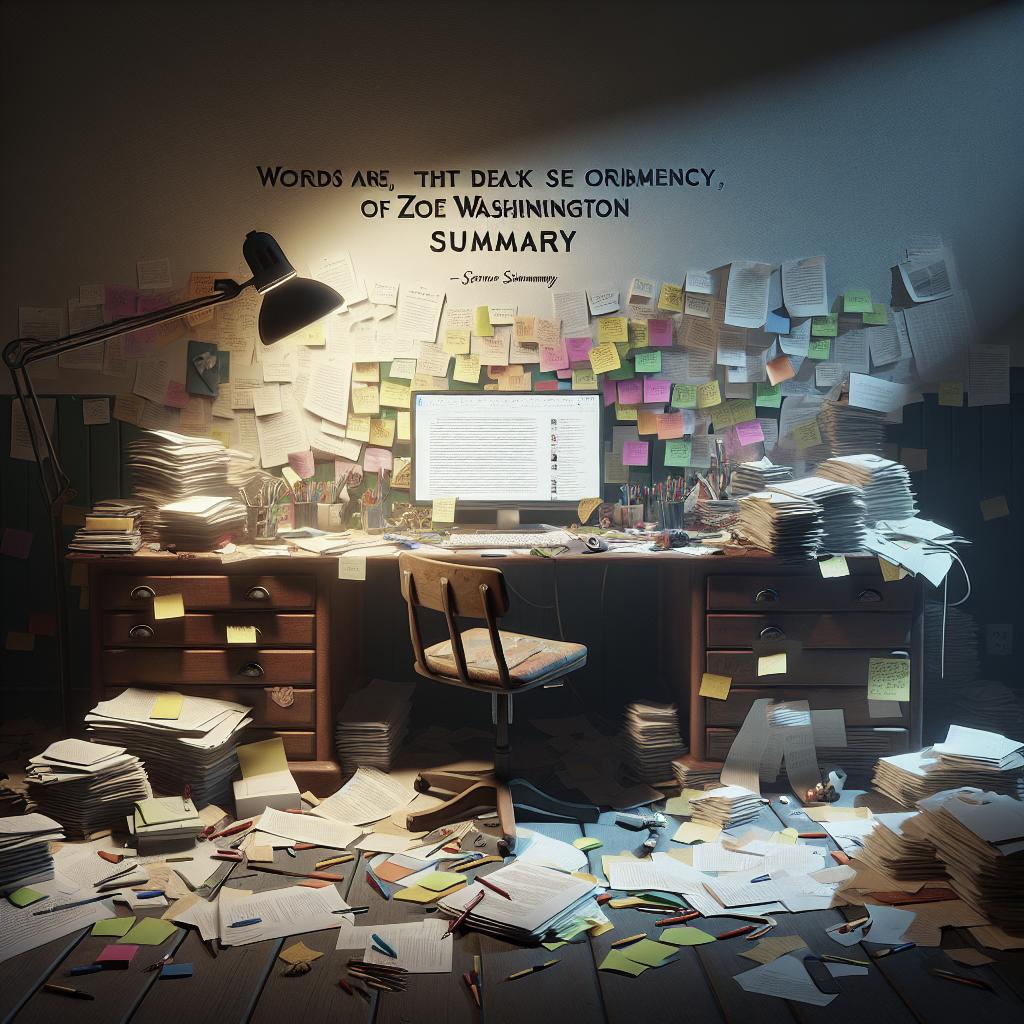“`html
From the Desk of Zoe Washington: A Heartfelt Journey
In this blog post, we delve into the poignant and compelling narrative of the book “From the Desk of Zoe Washington” by Janae Marks. This heartfelt story follows Zoe, a determined young girl, on a quest to uncover the truth about her imprisoned father’s innocence. As we explore the major themes and character dynamics, we uncover the multifaceted portrayal of family, justice, and the power of persistent hope. Through the lens of Zoe’s investigative journey, readers are invited to question societal prejudices while celebrating the unwavering love that perseveres in times of adversity. In our post, we will first introduce Lena S. Andrews, a key character in the series, followed by an engagement section inviting readers to share their thoughts and conclude with related literature themes that enrich our understanding of Zoe’s world.
Lena S. Andrews
Lena S. Andrews, although not the central character of the story, plays a crucial role in “From the Desk of Zoe Washington.” As Zoe’s supportive grandmother, Lena embodies the essence of family strength and resilience that threads through the narrative. She is a character who exudes quiet wisdom and provides a stable foundation for Zoe, particularly when she is confronted with the emotional complexities of her father’s imprisonment. Lena’s unwavering faith in her son and her nurturing presence serve as a guiding light for Zoe as she embarks on her mission to uncover the truth.
Throughout the novel, Lena’s character develops layers that reflect a rich emotional history and connection to her family’s past. Her involvement in various community activities showcases her as a woman deeply aware of the social injustices that plague society. Lena frequently acts as a bridge between the past and present, sharing stories of her own experiences, which ignite Zoe’s sense of justice and determination. Her presence in the narrative is not just that of a supportive guardian but also of a teacher who imparts crucial lessons about resilience and advocacy.
In many ways, Lena S. Andrews represents the unsung heroes in familial structures—the ones whose strength provides the backbone during times of crisis. Her character resonates with readers as she encapsulates the enduring spirit and quiet contributions of elders who shape the lives and values of the younger generation. Lena’s ability to foster hope and inspire action in Zoe anchors the story, weaving in themes of love and justice that elevate the novel to a profound reflection on human bonds.
Share this:
Discussing “From the Desk of Zoe Washington” opens the door to a broader conversation about the impact of familial support and the fight for justice in society. We encourage our readers to share their thoughts and feelings regarding the book and connect with others who have been touched by Zoe’s story. It’s a chance to explore various perspectives and engage in meaningful dialogues about the book’s themes.
Engagement through social media platforms or book club discussions quickly unites bibliophiles and those new to this genre alike, allowing for an exchange of interpretations and emotional responses. These conversations can expand on the book’s exploration of prejudice and the pursuit of truth, encouraging us to draw parallels to our own experiences and societal realities. Furthermore, sharing allows other readers to discover the book, promoting the transformative power of literature as a tool for social change.
If you’ve read the book or are considering it, post your reflections online, tag this post, or comment below to join a community of likeminded individuals who value the power of storytelling. Share how Zoe’s journey impacted your perspective on justice and family, fostering a collective appreciation for narratives that inspire action and empathy.
Related
“From the Desk of Zoe Washington” shares thematic elements with other literary works centered on the pursuit of justice, familial bonds, and the resilience of the human spirit. For instance, Jacqueline Woodson’s “Brown Girl Dreaming” also explores themes of identity and justice, using poetry to convey complex emotions and societal perceptions. Both stories shed light on the experience of young protagonists grappling with their identity and striving to make their voices heard in a world that often underestimates them.
Similarly, “A Good Kind of Trouble” by Lisa Moore Ramée finds its protagonist navigating middle school life while becoming awakened to the injustices of the world around her. Like Zoe, the main character Shayla discovers her passion for advocacy and learns the importance of standing up for what is right. Through these narratives, readers are encouraged to embrace introspection and recognize the power of individual actions in contributing to a larger societal dialogue.
Engaging with these related works not only enriches our understanding of Zoe Washington’s journey but also reinforces the significance of exploring diverse stories and perspectives within literature. They create a tapestry of narratives that champion empathy, understanding, and positive change, enabling readers to imagine new possibilities for themselves and their communities.
Lessons Learned
| Aspect | Details |
|---|---|
| Key Themes | Justice, Family, Resilience, Hope |
| Character Highlight | Lena S. Andrews as a symbol of strength and wisdom |
| Reader Engagement | Opportunities for sharing thoughts and connecting over shared insights |
| Related Works | “Brown Girl Dreaming” by Jacqueline Woodson and “A Good Kind of Trouble” by Lisa Moore Ramée emphasizing similar themes |
“`


